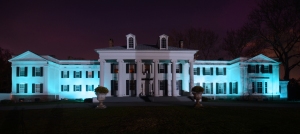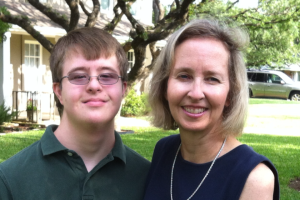by Sarah Wernikoff
Sarah Wernikoff was honored with the Luminary Award at our inaugural recognition gala, the Sky’s the Limit. Sarah chaired the LuMind Foundation Board from 2012-2014 and served as a member of the board for seven years. She presented the following remarks on why LuMind Research Down Syndrome Foundation and Down syndrome cognition research are important to her. Thank you, Sarah, for your continued support and inspiration!
I feel very honored to be acknowledged in this way – particularly at the same event as Dr. Mobley — the original visionary behind this field of research, and Dr. Edgin. It’s only due to their genius, creativity and perseverance that we are all here today. I also want to thank the Whites who had the vision to make this organization possible, and who have done so much for this very important cause over the last decade. And last, I can’t leave out Carolyn Cronin. The breath of fresh air that is carrying us into the future. Carolyn, thank you for your tireless commitment.
 It’s ironic for me to be here in this way with Dr. Mobley, and Patty White, as they are the very two people who I first had contact with 11 years ago soon after my daughter Tate was born in October of 2003.
It’s ironic for me to be here in this way with Dr. Mobley, and Patty White, as they are the very two people who I first had contact with 11 years ago soon after my daughter Tate was born in October of 2003.
It’s still hard for me to talk about those early days, …but needless to say learning Tate had Ds was a complete shock to our family. We knew next to nothing about Ds and didn’t know what to expect – all we knew then was that our lives were going to be very different than what we had planned and envisioned.
It was between the shock, and I’ll admit the tears, of those initial few days that my husband Dan and I started thinking about research. What was going on the field of research to help us help assure our daughter would have the very best opportunities in life as possible? We quickly learned about all of the community, educational, and advocacy resources that had made enormous strides in the past decade or two for people with Ds, and felt very fortunate to benefit from those tremendous efforts and successes……but what about research?
At the time, in 2003, if you went online to search Ds cognition research finding information was like finding a needle in a haystack. So after finding virtually nothing online, Dan and I began to network through Stanford, and Bill — I’m sure you don’t remember this, but I eventually tracked down your contact information and started hounding you (one might even say stalking you, but I will leave those details in the past). But it was you who put me in touch with Patty who at the time was in the very beginning stages of founding this organization with Jim and the Kafkers in Boston.
So…that’s a long-winded way to tell you all how I got involved, but I tell it for two reasons.
The first is to paint the picture of how far this research has come in the last decade. Today, in large part due to the work of those in this room, this same Google search results in pages and pages and pages of information and research breakthroughs. It was the goal of the honorees in this room to be a catalyst to cognition research, collaborate with the best and brightest and bring new researchers into the field – and they have done this in an incredibly short amount of time, and on an absolute shoestring budget.
The other reason I share the story is explain how innate and intuitive it was for Dan and I to know that cognition research was THE most important opportunity for our daughter.
When people ask me about my volunteer work and what LuMind is all about, I tell them it supports cognition research for people with Down syndrome. This usually results in blank stares, long pauses and a sense of confusion. Its’ not an easy thing to understand, like cancer research for example. So I always try to describe it in more familiar terms, like glasses for someone who is visually impaired, or cochlear implants for someone who is hearing impaired.
 We are not trying to change anyone — but just turn the dial and move the meter a bit on abilities. The ability to remember. How can you learn if you can’t remember? The ability and speed people with Ds process information. The ability to communicate, and ability to articulate thoughts and feelings. It’s hard to put it into words, and in some ways you need to know someone with Ds well to understand it, but even small improvements in these areas will have a huge impact. The small improvements will impact the work they do at school, the richness of their friendships, the type of job they will have one day. It will have a very direct impact on each child’s overall independence as adults, and even more importantly their risk of developing early onset Alzheimer’s disease.
We are not trying to change anyone — but just turn the dial and move the meter a bit on abilities. The ability to remember. How can you learn if you can’t remember? The ability and speed people with Ds process information. The ability to communicate, and ability to articulate thoughts and feelings. It’s hard to put it into words, and in some ways you need to know someone with Ds well to understand it, but even small improvements in these areas will have a huge impact. The small improvements will impact the work they do at school, the richness of their friendships, the type of job they will have one day. It will have a very direct impact on each child’s overall independence as adults, and even more importantly their risk of developing early onset Alzheimer’s disease.
Dan and I are convinced the research, whether results are subtle or significant, will have an enormous impact on Tate’s future. Yes, the years of weekly PT, OT, speech, socials skills therapy, and of course educational support we all give our kids is fundamental to their success, but cognition research, in my book has equal footing — and the potential to be a game changer to the futures of all those with Ds.
So it feels a little awkward to be here receiving an award for this work that is obviously very self-serving. It truly has been a labor of love.
 And in case you were wondering, I thought I’d close by sharing that we were actually right in 2003 that our lives were going to be different. But what we didn’t know then, was what an overwhelmingly positive different it would be. Tate is the most fun, most loving and sincerely kind person we know. She is the nucleus of our family and it has been an absolute privilege to be her parents. Our goal, as with all of our kids, is for her to live her life to her greatest potential, and I thank all of you in this room for helping us do that.
And in case you were wondering, I thought I’d close by sharing that we were actually right in 2003 that our lives were going to be different. But what we didn’t know then, was what an overwhelmingly positive different it would be. Tate is the most fun, most loving and sincerely kind person we know. She is the nucleus of our family and it has been an absolute privilege to be her parents. Our goal, as with all of our kids, is for her to live her life to her greatest potential, and I thank all of you in this room for helping us do that.

 First Lady Mary Pat Christie Spearheads “Light the Way” Initiative with First Spouses from Across the Nation to Bring Greater Awareness of Down Syndrome Cognition Research
First Lady Mary Pat Christie Spearheads “Light the Way” Initiative with First Spouses from Across the Nation to Bring Greater Awareness of Down Syndrome Cognition Research 



 One of the most interesting things I’ve learned since joining LuMind Foundation is the wealth of possibilities on the horizon. I’m a businessman with a background in aerospace, and I therefore appreciate the power of momentum and the efficient use of energy to keep making progress. Thanks to my son Taylor who has Down syndrome, I also have a personal interest in wanting to propel Ds research forward at mach speeds.
One of the most interesting things I’ve learned since joining LuMind Foundation is the wealth of possibilities on the horizon. I’m a businessman with a background in aerospace, and I therefore appreciate the power of momentum and the efficient use of energy to keep making progress. Thanks to my son Taylor who has Down syndrome, I also have a personal interest in wanting to propel Ds research forward at mach speeds. The momentum is exciting, but without additional funding we’re leaving research on the table.
The momentum is exciting, but without additional funding we’re leaving research on the table. 
 We are often asked about programs that let our supporters do more with their donation. Here are some ways to have a greater impact on Down syndrome cognition research.
We are often asked about programs that let our supporters do more with their donation. Here are some ways to have a greater impact on Down syndrome cognition research.